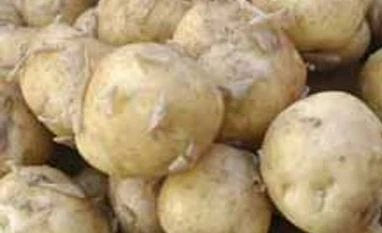With the West Bengal government threatening to impose a ban on selling potatoes to other states, prices of the commodity are expected to rise in neighbouring states.
With a contribution of about 25 per cent to India’s potato production, West Bengal is the second-largest producer of the commodity, after Uttar Pradesh. It sells about 5.5 million tonnes (mt) to Odisha, parts of Andhra Pradesh, Bihar, Jharkhand, Chhattisgarh and north-eastern states.
At a meeting with potato traders on Monday, West Bengal Chief Minister Mamata Banerjee said the government would impose a ban on selling the commodity to other states if potato prices didn’t fall by July 8. She also directed traders to sell potatoes at Rs 1,200 a quintal, adding the retail price be fixed at Rs 1,400 a quintal (Rs 14 a kg). Currently, retail potato prices stand at Rs 17-18 a kg, while the wholesale price is Rs 14 a kg.
In November 2013, when the state government had imposed a ban on selling potatoes to other states, there was an unprecedented rise in prices of the commodity in neighbouring states. This time, however, the rise in prices might not be very steep, as traders in neighbouring states have already bought substantial quantities in the loading season in March.
“Taking a cue from the last year, traders were expecting a border barricade this year. Therefore, about two mt of potatoes have already been sent to other states, against 1.5 mt last year,” said Patit Paban De, member of the West Bengal Cold Storage Association.
At 9.5 mt, potato production in West Bengal this year has been about five per cent lower than last year.
If the state government imposed a ban on potato sales to other states, cold storage owners could be left with unsold stock of about one mt by December, De said. With 4.1 mt of the commodity in cold storages, prices had shot up due to hoarding on expectations of a lower Kharif crop in southern states.
R P Gupta, director of National Horticultural Research and Development Foundation, said potato prices were likely to remain stable through the next few months on account of better production. “West Bengal caters mostly to eastern and north-eastern states. More, Bihar is also supplying to north-eastern and other eastern states. At the wholesale level, potato prices are Rs 13-14 a kg, which is not an aberration. Prices should remain stable,” he added.
During 2013-14, India had produced 46.3 mt of potatoes, 45.3 mt in 2012-13, Gupta said.
With a contribution of about 25 per cent to India’s potato production, West Bengal is the second-largest producer of the commodity, after Uttar Pradesh. It sells about 5.5 million tonnes (mt) to Odisha, parts of Andhra Pradesh, Bihar, Jharkhand, Chhattisgarh and north-eastern states.
At a meeting with potato traders on Monday, West Bengal Chief Minister Mamata Banerjee said the government would impose a ban on selling the commodity to other states if potato prices didn’t fall by July 8. She also directed traders to sell potatoes at Rs 1,200 a quintal, adding the retail price be fixed at Rs 1,400 a quintal (Rs 14 a kg). Currently, retail potato prices stand at Rs 17-18 a kg, while the wholesale price is Rs 14 a kg.
In November 2013, when the state government had imposed a ban on selling potatoes to other states, there was an unprecedented rise in prices of the commodity in neighbouring states. This time, however, the rise in prices might not be very steep, as traders in neighbouring states have already bought substantial quantities in the loading season in March.
“Taking a cue from the last year, traders were expecting a border barricade this year. Therefore, about two mt of potatoes have already been sent to other states, against 1.5 mt last year,” said Patit Paban De, member of the West Bengal Cold Storage Association.
At 9.5 mt, potato production in West Bengal this year has been about five per cent lower than last year.
If the state government imposed a ban on potato sales to other states, cold storage owners could be left with unsold stock of about one mt by December, De said. With 4.1 mt of the commodity in cold storages, prices had shot up due to hoarding on expectations of a lower Kharif crop in southern states.
R P Gupta, director of National Horticultural Research and Development Foundation, said potato prices were likely to remain stable through the next few months on account of better production. “West Bengal caters mostly to eastern and north-eastern states. More, Bihar is also supplying to north-eastern and other eastern states. At the wholesale level, potato prices are Rs 13-14 a kg, which is not an aberration. Prices should remain stable,” he added.
During 2013-14, India had produced 46.3 mt of potatoes, 45.3 mt in 2012-13, Gupta said.
)